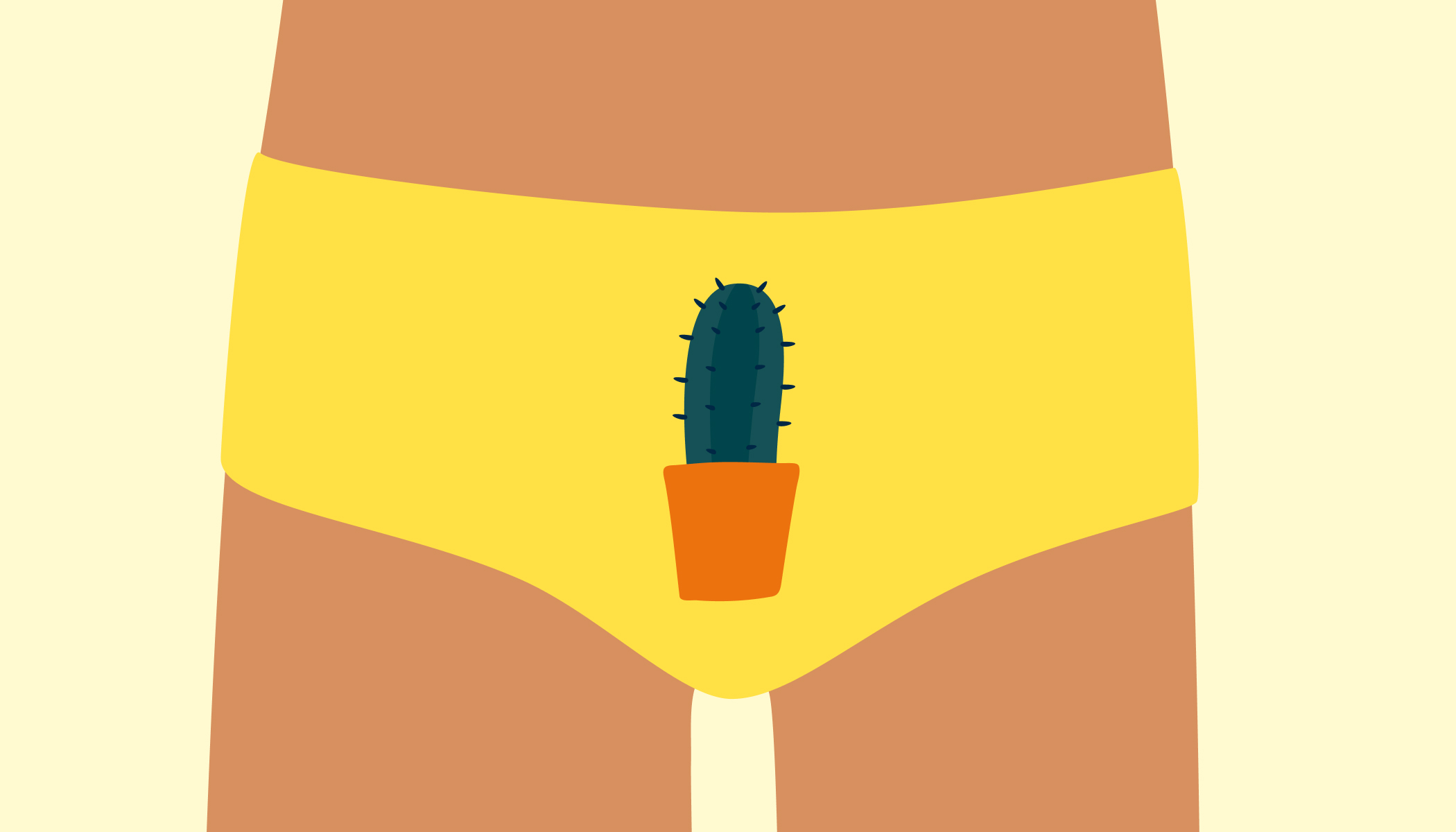Vaginal dryness is very common. Around 17% of women aged 18-50 and more than half of post-menopausal women over the age of 51 experience vaginal dryness.
Lower oestrogen is a common trigger of vaginal dryness, and menopause, pregnancy, birth and breastfeeding can all impact oestrogen levels. But there are other causes too, including autoimmune diseases, certain lifestyle choices and medical or surgical treatments.
What’s vaginal lubrication and why do we need it?
‘Vaginal secretion is created by glands in the cervix to maintain a moist, slightly acidic environment in the vagina,’ says Dr Elisabeth Rosen, a Livi doctor who specialises in gynaecology and obstetrics.
This secretion helps maintain the right balance of bacteria and prevents infection by flushing out dead cells and unwanted bacteria to clean the vagina.
‘The secretion changes throughout the menstrual cycle to help or prevent the movement of sperm and to protect the body and a potential pregnancy from infections,’ Dr Rosen says.
‘The lubrication you experience when you’re sexually aroused is different. It’s activated in the Bartholin’s glands right by the vaginal opening. This gland produces secretions all the time, but it’s also activated when you’re sexually aroused to protect the sensitive membrane in the vagina during penetration.’
What are the symptoms of vaginal dryness?
The most common vaginal dryness symptoms include:
- Vaginal discomfort, tenderness and pain
- Pain during penetration
- Itching in and around the vagina
‘Reduced moisture in the vagina can also upset the balance of vaginal flora – the bacteria living inside the vagina – which can increase the risk of issues like urinary tract infections, vaginitis and bacterial vaginosis,’ says Dr Rosen.
What causes vaginal dryness?
Vaginal dryness has a range of causes, but it’s often linked to the production of hormones like oestrogen and progesterone. The best treatment for dryness depends on what’s causing it, with several different causes:
1. Perimenopause and menopause
During perimenopause and menopause, the body produces less oestrogen. This can cause the mucous membranes in the vagina – which are usually moist, elastic and pink – to become increasingly dry and pale. ‘Vaginal dryness during menopause is also called vaginal atrophy,’ explains Dr Rosen. ‘It affects more than 50% of all post-menopausal women.
‘This can cause stinging and itchiness, as well as pain during sex. It can also affect the urinary tract, making you pee more often or leading to recurrent UTIs.’
You might notice vaginal dryness alongside symptoms like irregular bleeding, hot flashes or a change in libido.
Many menopausal women benefit from hormonal treatment.‘It’s very effective and safe for everyone, unless you’re undergoing treatment for breast cancer,’ says Dr Rosen.
2. Childbirth, breastfeeding and the early post-partum stage
‘This isn’t a cause for concern,’ explains Dr Rosen. ‘It’s perfectly natural and will pass. You might also experience missed periods or periods that haven’t returned as a result of hormones preventing ovulation.
‘Using a water-based lubricant can be a good idea, and if that’s not enough, a doctor may prescribe local oestrogen to use temporarily.’
3. Hormonal contraception
‘Vaginal dryness is a common side effect of hormonal contraceptives,’ says Dr Rosen. ‘This is because the body’s production of oestrogen and progesterone, which control the production of vaginal secretion, is replaced by the synthetic hormones in hormonal contraception.
‘As the synthetic hormones are not the same as the body’s natural hormones, they can’t fully recreate their functions. Most hormonal contraceptives contain quite a high concentration of hormones.
‘They’re also constant over time, unlike the menstrual cycle’s natural fluctuation. For some people, that’s not a problem at all, but for others it can cause problems like vaginal dryness. Trying a different type of hormonal contraception can help.’
4. Antidepressants
The primary role of SSRIs (selective serotonin reuptake inhibitors), a widely used type of antidepressant, is to increase our levels of serotonin – a key hormone that stabilises our mood.
‘But antidepressants also impact receptors for a neurotransmitter called acetylcholine,’ explains Dr Rosen. ‘This blocks certain involuntary muscle movements and bodily functions, which can lead to vaginal dryness.’
If you’re experiencing vaginal dryness, you can speak to a doctor about trying a different type of medication.
5. Hysterectomy
Both the cervix and the cells that produce vaginal secretions are often removed during a hysterectomy, and this can cause vaginal dryness.
‘If you’re experiencing these symptoms after having a hysterectomy, talk to a doctor,’ says Dr Rosen. ‘Local oestrogen can help tremendously.’
6. Chemotherapy
Additional symptoms: Menopause triggered by medicine, also known as iatrogenic menopause or medical menopause
‘Chemotherapy often affects the hormone production of the ovaries,’ says Dr Rosen. ‘This puts the body in a state of chemical menopause.’
Speak to a doctor about vaginal dryness symptoms. They may be able to offer solutions during your treatment.
7. Over-washing
‘Some people think that it’s necessary to flush out the vagina with water,’ says Dr Rosen. ‘But water has a dehydrating effect. The vagina is very clever and cleans itself – that’s exactly the purpose of the secretions and discharge. It’s completely normal as long as it’s not accompanied by pain, discomfort or a foul smell.
‘Simply wash the vulva gently with water – don’t use soap or other hygiene products.’
8. Sjögren’s syndrome
‘Sjögren’s syndrome is an autoimmune disease that causes chronic inflammation of the body’s secretion-producing glands, which leads to less secretion production. It can cause a dry mouth, eyes, skin and a dry cough. As a result it can also cause you to have a dry, itchy vagina,’ Dr Rosen explains.
Sjögren’s syndrome is relatively uncommon, affecting far more women than men, especially from midlife.
9. Diabetes
‘High blood sugar levels can cause damage to the body’s small nerves and blood vessels,’ says Dr Rosen. ‘This can affect the glands in the cervix, resulting in dry mucous membranes.’ Other symptoms of diabetes include increased thirst, needing to pee more often, lack of energy and blurred vision.
10. Not feeling aroused during sex
Sometimes, people experience dryness when they’re simply not aroused.
‘Use a water-based lubricant, or try more foreplay or other alternatives to penetration. I’d advise avoiding latex condoms as well,’ says Dr Rosen. ‘It’s also important to try to explore why you may not be feeling aroused, to avoid developing chronic vaginal pain.’
Read more on what might be the cause of a low libido.
11. Antihistamines
Antihistamines block your body’s histamine secretion to help relieve a runny nose or watery, itchy eyes.
‘They can also affect the mucous membrane of the vagina, making it drier than normal,’ Dr Rosen explains.
When should I speak to a doctor about vaginal dryness?
‘If you’re struggling with any of these symptoms and there isn’t an obvious, temporary cause, like breastfeeding, speak to a doctor,’ advises Dr Rosen.
Never ignore these symptoms:
- Pain during sex that doesn’t go away with increased arousal
- Recurring UTIs
- Recurring thrush or bacterial vaginosis
- Vaginal bleeding that’s unusual and abnormal for you
This article has been medically approved by Dr Elisabeth Rosen.


